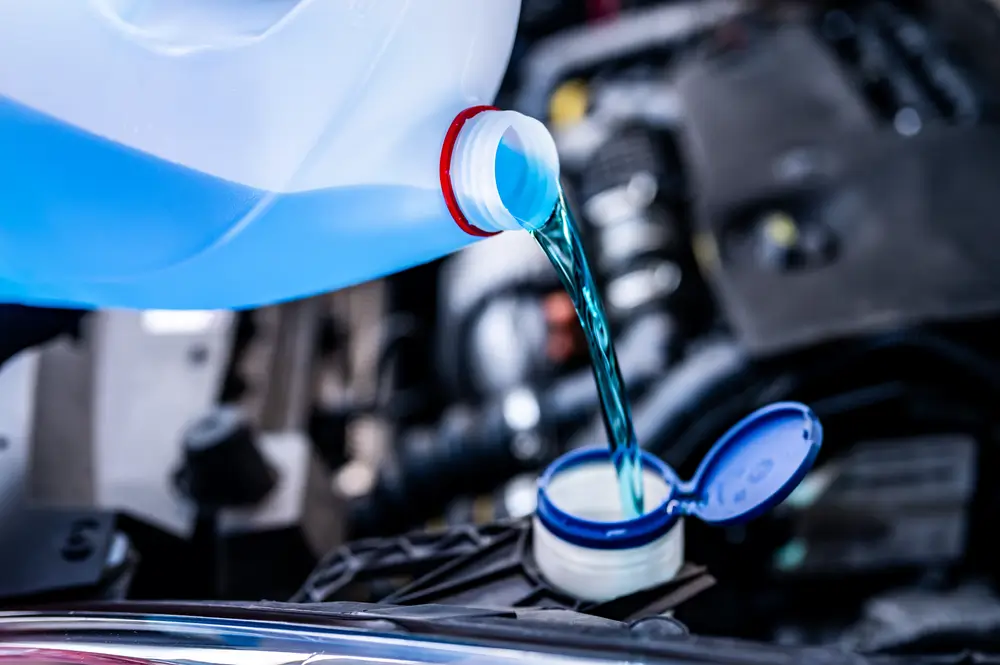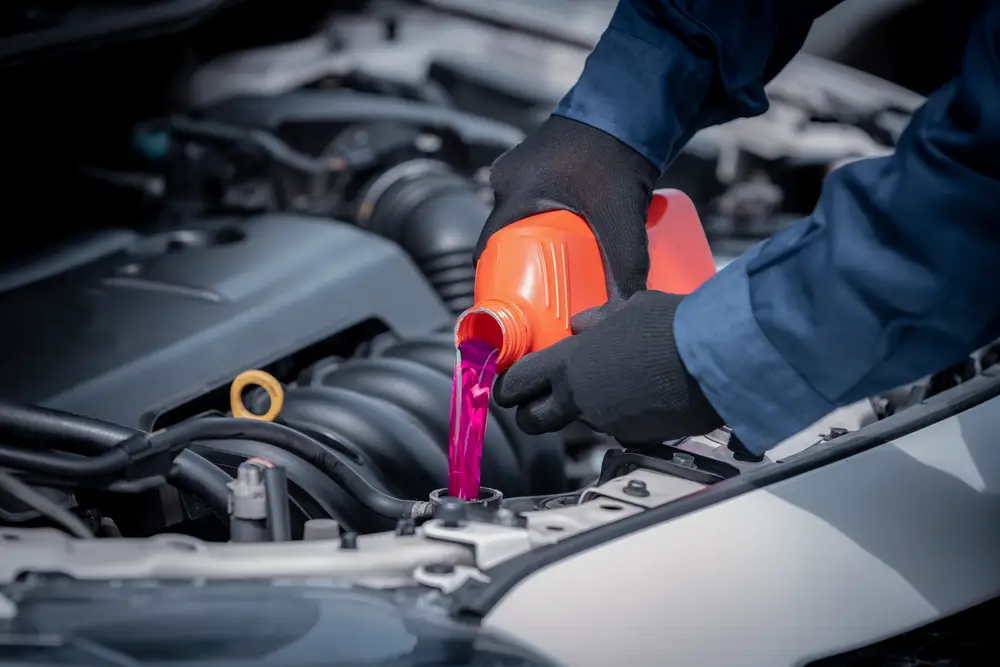When it comes to taking care of your vehicle, it’s vital to grasp the difference between antifreeze and coolant. Both play essential roles in keeping your car running smoothly, but understanding when and how to use them can be the key to avoiding breakdowns and costly repairs.
To keep you well-informed, we’ve prepared a detailed comparison of antifreeze vs. coolant. We’ll explore their definitions, functions, and purposes, so you can make the right choices for your vehicle.

What is Antifreeze?
Antifreeze, as its name suggests, is primarily formulated to prevent freezing. It’s a specialized fluid added to your vehicle’s cooling system to lower the freezing point of water. This critical function ensures that even during the coldest of Detroit winters, the liquid in your engine’s cooling system won’t turn into ice. Antifreeze typically consists of a mixture of water and chemicals, primarily ethylene glycol or propylene glycol, which are essential for providing protection against freezing.
What is Coolant?
Often used interchangeably with antifreeze, coolant is a more comprehensive term. It comprises not only antifreeze but also an array of additives. These additives serve various functions, including raising the boiling point of the cooling system, preventing corrosion, and lubricating the water pump. Coolant is a versatile fluid that safeguards your engine from both freezing in the winter and overheating in the summer.
Antifreeze vs. Coolant: What’s the Main Difference?
The primary distinction between antifreeze and coolant lies in their purposes. Antifreeze is primarily designed to prevent freezing, while coolant is a mixture that offers a broader range of functions, encompassing freeze protection, corrosion prevention, and temperature regulation. Antifreeze essentially serves as a component of coolant, so when people mention coolant, they often refer to a blend of antifreeze and additives.
Which is Ideal for Detroit Vehicles?
In Detroit’s ever-fluctuating climate, which swings from scorching hot in the summer to bitterly cold in the winter, it’s advisable to opt for a coolant that incorporates antifreeze. This combination ensures year-round engine protection. The inclusion of antifreeze prevents the cooling system from freezing during harsh winters, while the additives in the coolant provide comprehensive protection and lubrication throughout the year.
What Happens to My Car with Low Antifreeze and Coolant Levels?
Insufficient levels of antifreeze and coolant can pose significant risks to your Detroit vehicle. When levels are too low, you run the risk of your engine overheating during summer or freezing in winter. Inadequate coolant levels can lead to reduced performance, potential engine damage, and costly repairs. Regularly checking your coolant levels and topping up when needed is essential to keep your vehicle running smoothly in all weather conditions.

Signs That Your Car Needs a Coolant or Antifreeze Service
Maintaining the proper levels of coolant and antifreeze is crucial for your vehicle’s well-being. If you suspect that your car may need a coolant or antifreeze service, be vigilant for these warning signs and don’t hesitate to contact Jim’s Collision for comprehensive coolant and antifreeze services:
Overheating
One of the most apparent signs that your vehicle requires attention is when it starts to overheat. If your temperature gauge reads in the red zone or you notice steam rising from under the hood, it’s time to check your coolant levels.
Coolant Leaks
If you notice puddles of bright-colored liquid (typically green, orange, pink, or blue) beneath your car, it’s a strong indication of a coolant or antifreeze leak. These leaks can lead to a dangerous lack of fluid in your cooling system.
Fluctuating Temperature Gauge
A temperature gauge that frequently swings from hot to cold and back may be a sign that your coolant levels are inconsistent. This can result in an engine that struggles to maintain the right operating temperature.
Sweet, Pungent Odor
A sweet, syrupy smell inside or outside your vehicle can be a sign of a coolant leak. This odor is often distinctive and is a clear indicator that something is amiss.
Visible Corrosion
Pop the hood and inspect your radiator, hoses, and other cooling system components for signs of corrosion or rust. This can be a symptom of improper coolant or antifreeze levels, as well as the need for a coolant system flush.
The Importance of Understanding Antifreeze vs. Coolant
In Detroit, where weather extremes are the norm, knowing the difference between antifreeze vs. coolant and using the right mixture is essential for keeping your vehicle in tip-top shape. Whether you’re braving the icy winters or enduring the scorching summers, the proper coolant mixture ensures that your engine remains protected, preventing costly damage and repairs.
